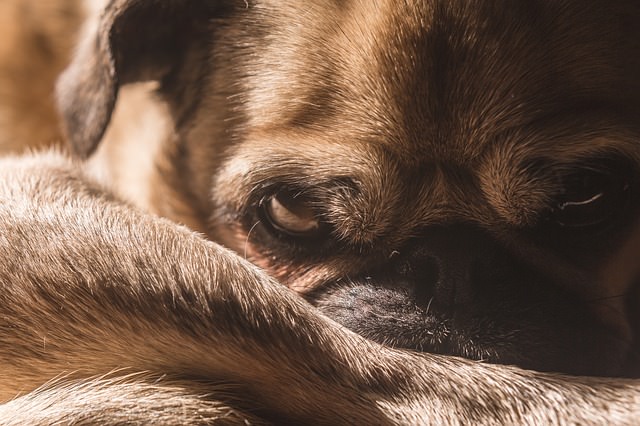Dogs have gas. Almost all dogs have flatulence (pass wind) at one time or another. It is embarrassing and gross. Some dogs have an ongoing and frequent problem that impacts the quality of life for the whole family. Have you ever thought about why this disgusting occurrence happens?
The way a dog eats and digests his food plays a role in how it is processed (and what byproducts are produced during the processing). Bacteria in the gut act upon the food as it passes through the digestive processes and produce gases that are released as flatulence.

A dog with thick lips or a short snout can be a sloppy eater. These dogs eat fast and seem to swallow a lot of air as they eat, which may contribute to the amount of gas that exits the other end. If you have a dog with a short face, like a Boxer or Bulldog or one with floppy lips, like a Mastiff or Saint Bernard, try finding ways to slow his eating down. Some people feed these dogs using puzzle toys that dispense the food in small quantities and some people just place toys or balls in the bowl with the food to slow him down.
The type and digestibility of the dog’s diet plays a big part in whether or not she will produce excess gas. Certain foods are notorious for causing flatulence even for people. The amount of fiber in a dog’s diet can affect the types of bacteria that are able to act on the waste as it travels through the gastrointestinal tract. Highly digestible foods with minimal fillers can be more easily processed by the bowel and cause less gas. If your dog has a very severe gas problem, ask your vet for a food trial with prescription diet that is designed for such issues. If the gas is improved during the food trial, you will know that it is a result of the diet and then you can try adding in ingredients one at a time to isolate the ones that causing the odiferous issue.

There are disease processes that can cause excessive gas. Things like inflammatory bowel disease or malabsorption/maldigestion syndromes. In these cases, the inflammation is a contributor to the movement in the bowel as well as the natural flora that are maintained there. Some patients with food allergy will have excess gas from a similar process.
If your dog has really bad and frequent gas, try finding ways to slow her eating to see if that helps. Then try different diets to figure out what impact those have. If you cannot get relief with these strategies, it is time to bring in your vet. There are diagnostics tests that can help figure out how your dog is able to digest her food. Depending on what is uncovered, there are definitely treatment protocols that can help. If it is just an occasional “bad air”, it is probably not a dangerous situation, but if it is frequent, it may be accompanied by loose stools and intestinal cramping and should be checked into by your veterinary team.
Please look me up on Facebook for more tips on animal health!
